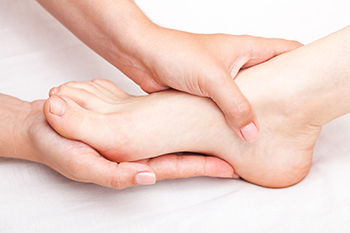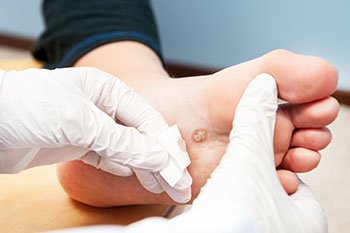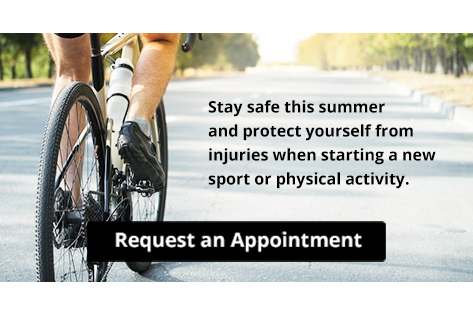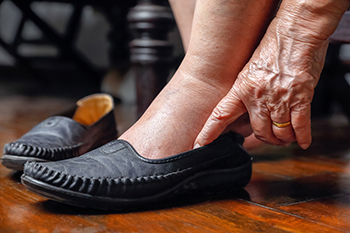Connect With Us
Blog
Items filtered by date: June 2021
Children Limping May Indicate Sever’s Disease
 Active children may be more likely to experience heel pain. This pain can be indicative of a condition known as Sever’s disease, and can target children and young adolescents. This uncomfortable ailment affects the growth plate in the heel and can occur as a result of extensive pressure exerted on the area where the Achilles tendon meets the heel. Parents may notice their child may begin to limp, in addition to experiencing a decrease in flexibility if their child is afflicted with Sever’s disease. Prompt treatment generally begins with stopping the activity that caused this condition, and it is beneficial to rest the affected foot. Some children find it may help to perform specific stretches that target the Achilles tendon and calf. If you notice your child has symptoms of Sever’s disease, it is strongly suggested that you schedule a consultation with a podiatrist as quickly as possible who can determine what the most effective treatment is.
Active children may be more likely to experience heel pain. This pain can be indicative of a condition known as Sever’s disease, and can target children and young adolescents. This uncomfortable ailment affects the growth plate in the heel and can occur as a result of extensive pressure exerted on the area where the Achilles tendon meets the heel. Parents may notice their child may begin to limp, in addition to experiencing a decrease in flexibility if their child is afflicted with Sever’s disease. Prompt treatment generally begins with stopping the activity that caused this condition, and it is beneficial to rest the affected foot. Some children find it may help to perform specific stretches that target the Achilles tendon and calf. If you notice your child has symptoms of Sever’s disease, it is strongly suggested that you schedule a consultation with a podiatrist as quickly as possible who can determine what the most effective treatment is.
Sever's disease often occurs in children and teens. If your child is experiencing foot or ankle pain, see Vivian C. Iwu, DPM from Choice Podiatry Center. Our doctor can treat your child’s foot and ankle needs.
Sever’s Disease
Sever’s disease is also known as calcaneal apophysitis, which is a medical condition that causes heel pain I none or both feet. The disease is known to affect children between the ages of 8 and 14.
Sever’s disease occurs when part of the child’s heel known as the growth plate (calcaneal epiphysis) is attached to the Achilles tendon. This area can suffer injury when the muscles and tendons of the growing foot do not keep pace with bone growth. Therefore, the constant pain which one experiences at the back of the heel will make the child unable to put any weight on the heel. The child is then forced to walk on their toes.
Symptoms
Acute pain – Pain associated with Sever’s disease is usually felt in the heel when the child engages in physical activity such as walking, jumping and or running.
Highly active – Children who are very active are among the most susceptible in experiencing Sever’s disease, because of the stress and tension placed on their feet.
If you have any questions, please feel free to contact our office located in Marietta, GA . We offer the newest diagnostic and treatment technologies for all your foot and ankle injuries.
Stay Safe While Being Active This Summer
Children and Shoes
 The best shoes for children will always meet their physical needs as their feet develop. Babies will benefit when they can walk barefoot while indoors, as this can help to strengthen the overall foot as the toes grip the floor. When your child starts to walk outside, it can be beneficial to choose a shoe that is made from good quality materials, in addition to ensuring that the sole is not too stiff. Shoe styles can vary, and it is helpful to get your child’s feet professionally measured, followed by trying on and walking in the shoes before any purchases are made. The feet are the foundation of the body, and shoes need to be changed as the feet grow. This allows the feet to have ample room to move and grow. If you would like additional information about what type of shoes to buy for your child, it is suggested that you confer with a podiatrist who can guide you toward the right shoes for your child.
The best shoes for children will always meet their physical needs as their feet develop. Babies will benefit when they can walk barefoot while indoors, as this can help to strengthen the overall foot as the toes grip the floor. When your child starts to walk outside, it can be beneficial to choose a shoe that is made from good quality materials, in addition to ensuring that the sole is not too stiff. Shoe styles can vary, and it is helpful to get your child’s feet professionally measured, followed by trying on and walking in the shoes before any purchases are made. The feet are the foundation of the body, and shoes need to be changed as the feet grow. This allows the feet to have ample room to move and grow. If you would like additional information about what type of shoes to buy for your child, it is suggested that you confer with a podiatrist who can guide you toward the right shoes for your child.
Making sure that your children maintain good foot health is very important as they grow. If you have any questions, contact Vivian C. Iwu, DPM of Choice Podiatry Center. Our doctor can provide the care you need to keep you pain-free and on your feet.
Keeping Children's Feet Healthy
Having healthy feet during childhood can help prevent medical problems later in life, namely in the back and legs. As children grow, their feet require different types of care. Here are some things to consider...
Although babies do not walk yet, it is still very important to take care of their feet.
Avoid putting tight shoes or socks on his or her feet.
Allow the baby to stretch and kick his or her feet to feel comfortable.
As a toddler, kids are now on the move and begin to develop differently. At this age, toddlers are getting a feel for walking, so don’t be alarmed if your toddler is unsteady or ‘walks funny’.
As your child gets older, it is important to teach them how to take care of their feet.
Show them proper hygiene to prevent infections such as fungus.
Be watchful for any pain or injury.
Have all injuries checked by a doctor as soon as possible.
Comfortable, protective shoes should always be worn, especially at play.
If you have any questions please feel free to contact our office located in Marietta, GA . We offer the newest diagnostic and treatment technologies for all your foot and ankle needs.
Shoe Sizing: It's Not Always Numbers
When buying new shoes, it can sometimes be difficult to find the right fit. There are several things to pay attention to when looking for a new pair of shoes other than just the numerical size. First, you want to make sure that the shoe is the right width. The widest point of the shoe is usually also the flex point, where the shoe is designed to bend with your foot. The right shoe for you will fit your foot snuggly at the widest point. You should also pay attention to the materials that the shoe is made of. Different materials have different purposes and will stretch and fit your foot differently over time. What you will use the shoe for is also important to consider. Finally, if you have any foot conditions, such as flat feet or bunions, or if you use orthotic inserts, this will affect the kind of shoe you should buy. For more information about how to find the right shoes for you, please consult with a podiatrist.
Finding a properly-fitting shoe is important in reducing injuries and preventing foot problems. For more information about treatment, contact Vivian C. Iwu, DPM from Choice Podiatry Center. Our doctor will treat your foot and ankle needs.
Proper Shoe Fitting
A common concern when it comes to foot health, having properly fitted shoes can help prevent injuries to the foot. Out feet affect our posture and gait, which in turn affects the biomechanics and overall bodily structure. With 33 joints, 26 bones, and over 100 ligaments, the potential for serious injury is much greater than one realizes. Although the feet cease growth in adulthood, they still change shape as they mature. Here are some factors to consider when it comes to investing in proper fitting shoes:
- Be sure the shoes fit correctly right away
- Ensure the ball of your foot fits comfortably in the widest portion of the shoes
- Even though they may look fashionable, improper fitting shoes can either create adverse conditions or exacerbate existing ones you may already have
- Walk along a carpeted surface to ensure the shoes comfortably fit during normal activity
Keeping in mind how shoes fit the biomechanics of your body, properly-fitting shoes are vitally important. Fortunately, it is not difficult to acquire footwear that fits correctly. Be sure to wear shoes that support the overall structure of your body. Do your feet a favor and invest in several pairs of well-fitted shoes today.
If you have any questions please feel free to contact our office located in Marietta, GA . We offer the newest diagnostic and treatment technologies for all your foot and ankle needs.
What Are the Symptoms of Tarsal Tunnel Syndrome?
 Tarsal tunnel syndrome may not be a commonly known ailment, but have you heard of carpal tunnel syndrome? Carpal tunnel affects the hands while tarsal tunnel syndrome occurs in the feet and can cause pain and discomfort. Research has indicated that people who have arthritis may be prone to developing this condition, in addition to frequently enduring high-stress activities. Some of the symptoms that are associated with this ailment often include tired feet and ankles, and the overall foot may be numb or have tingling sensations. Some patients have pain in the Achilles tendon area, and the ankles may appear swollen. There are several symptoms that can be associated with tarsal tunnel syndrome so it is strongly suggested that you consult with a podiatrist when they first develop. This type of doctor can properly diagnose and effectively treat this condition.
Tarsal tunnel syndrome may not be a commonly known ailment, but have you heard of carpal tunnel syndrome? Carpal tunnel affects the hands while tarsal tunnel syndrome occurs in the feet and can cause pain and discomfort. Research has indicated that people who have arthritis may be prone to developing this condition, in addition to frequently enduring high-stress activities. Some of the symptoms that are associated with this ailment often include tired feet and ankles, and the overall foot may be numb or have tingling sensations. Some patients have pain in the Achilles tendon area, and the ankles may appear swollen. There are several symptoms that can be associated with tarsal tunnel syndrome so it is strongly suggested that you consult with a podiatrist when they first develop. This type of doctor can properly diagnose and effectively treat this condition.
Tarsal tunnel syndrome can be very uncomfortable to live with. If you are experiencing tarsal tunnel syndrome, contact Vivian C. Iwu, DPM of Choice Podiatry Center. Our doctor can provide the care you need to keep you pain-free and on your feet.
Tarsal Tunnel Syndrome
Tarsal tunnel syndrome, which can also be called tibial nerve dysfunction, is an uncommon condition of misfiring peripheral nerves in the foot. The tibial nerve is the peripheral nerve in the leg responsible for sensation and movement of the foot and calf muscles. In tarsal tunnel syndrome, the tibial nerve is damaged, causing problems with movement and feeling in the foot of the affected leg.
Common Cause of Tarsal Tunnel Syndrome
- Involves pressure or an injury, direct pressure on the tibial nerve for an extended period of time, sometimes caused by other body structures close by or near the knee.
- Diseases that damage nerves, including diabetes, may cause tarsal tunnel syndrome.
- At times, tarsal tunnel syndrome can appear without an obvious cause in some cases.
The Effects of Tarsal Tunnel Syndrome
- Different sensations, an afflicted person may experience pain, tingling, burning or other unusual sensations in the foot of the affected leg.
- The foot muscles, toes and ankle become weaker, and curling your toes or flexing your foot can become difficult.
- If condition worsens, infections and ulcers may develop on the foot that is experiencing the syndrome.
A physical exam of the leg can help identify the presence of tarsal tunnel syndrome. Medical tests, such as a nerve biopsy, are also used to diagnose the condition. Patients may receive physical therapy and prescriptive medication. In extreme cases, some may require surgery.
If you have any questions please feel free to contact our office located in Marietta, GA . We offer the newest diagnostic and treatment technologies for all your foot and ankle needs.
How Are Foot Warts Removed?
 Plantar warts are rough, fleshy bumps or lesions that pop up on the soles of the feet due to an infection known as human papillomavirus (HPV). These warts may cause discomfort or pain and since they are contagious, they can spread and multiply. Individuals at home should never try to remove warts by cutting them off. Podiatrists have a variety of methods to choose from when it comes to wart removal. They may remove warts by using chemicals like salicylic acid to kill the wart cells and exfoliate the skin. Cryotherapy involves freezing the wart, also killing the affected cells. Curettage is cutting or scraping the wart away while electrosurgery burns the warts off. Laser treatment should only be considered for warts that do not respond to the previous treatments mentioned. If you have plantar warts, please seek the care of a podiatrist who can help determine the right treatment option for you.
Plantar warts are rough, fleshy bumps or lesions that pop up on the soles of the feet due to an infection known as human papillomavirus (HPV). These warts may cause discomfort or pain and since they are contagious, they can spread and multiply. Individuals at home should never try to remove warts by cutting them off. Podiatrists have a variety of methods to choose from when it comes to wart removal. They may remove warts by using chemicals like salicylic acid to kill the wart cells and exfoliate the skin. Cryotherapy involves freezing the wart, also killing the affected cells. Curettage is cutting or scraping the wart away while electrosurgery burns the warts off. Laser treatment should only be considered for warts that do not respond to the previous treatments mentioned. If you have plantar warts, please seek the care of a podiatrist who can help determine the right treatment option for you.
Plantar warts can be very uncomfortable. If you need your feet checked, contact Vivian C. Iwu, DPM from Choice Podiatry Center. Our doctor will assist you with all of your foot and ankle needs.
About Plantar Warts
Plantar warts are the result of HPV, or human papillomavirus, getting into open wounds on the feet. They are mostly found on the heels or balls of the feet.
While plantar warts are generally harmless, those experiencing excessive pain or those suffering from diabetes or a compromised immune system require immediate medical care. Plantar warts are easily diagnosed, usually through scraping off a bit of rough skin or by getting a biopsy.
Symptoms
- Lesions on the bottom of your feet, usually rough and grainy
- Hard or thick callused spots
- Wart seeds, which are small clotted blood vessels that look like little black spots
- Pain, discomfort, or tenderness of your feet when walking or standing
Treatment
- Freezing
- Electric tool removal
- Laser Treatment
- Topical Creams (prescription only)
- Over-the-counter medications
To help prevent developing plantar warts, avoid walking barefoot over abrasive surfaces that can cause cuts or wounds for HPV to get into. Avoiding direct contact with other warts, as well as not picking or rubbing existing warts, can help prevent the further spread of plantar warts. However, if you think you have developed plantar warts, speak to your podiatrist. He or she can diagnose the warts on your feet and recommend the appropriate treatment options.
If you have any questions please feel free to contact our office located in Marietta, GA . We offer the newest diagnostic and treatment technologies for all your foot and ankle needs.



